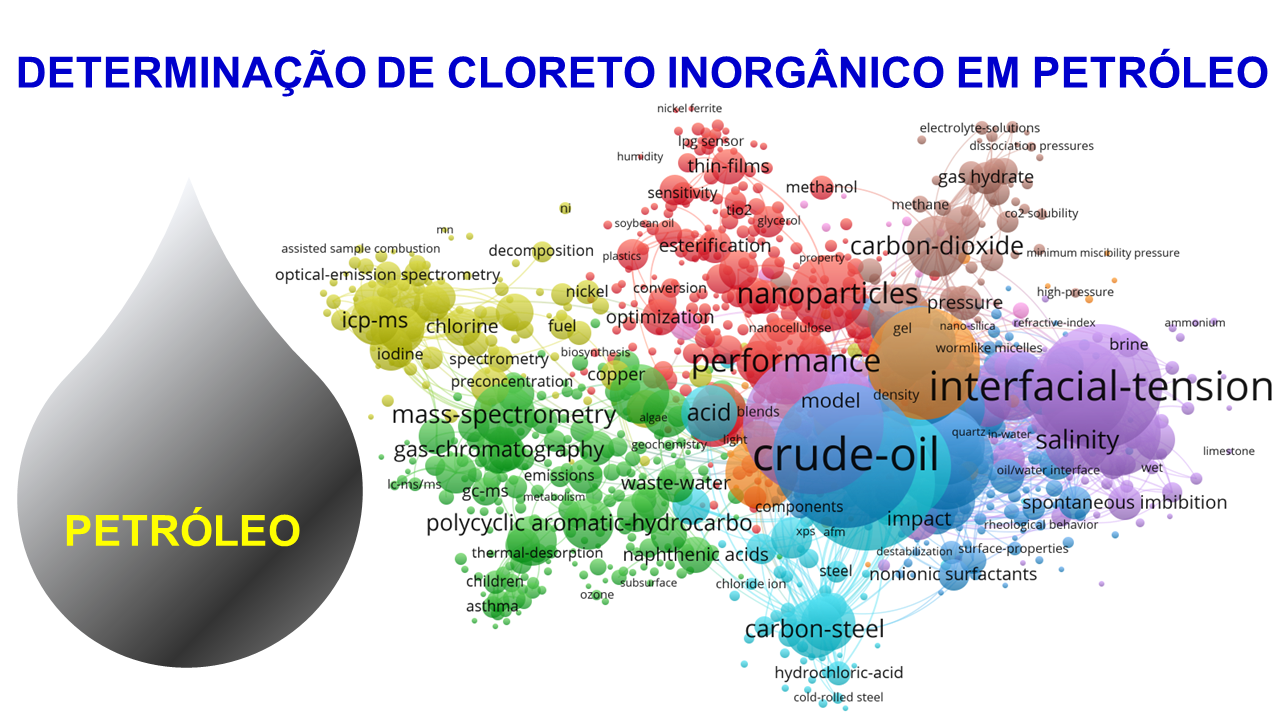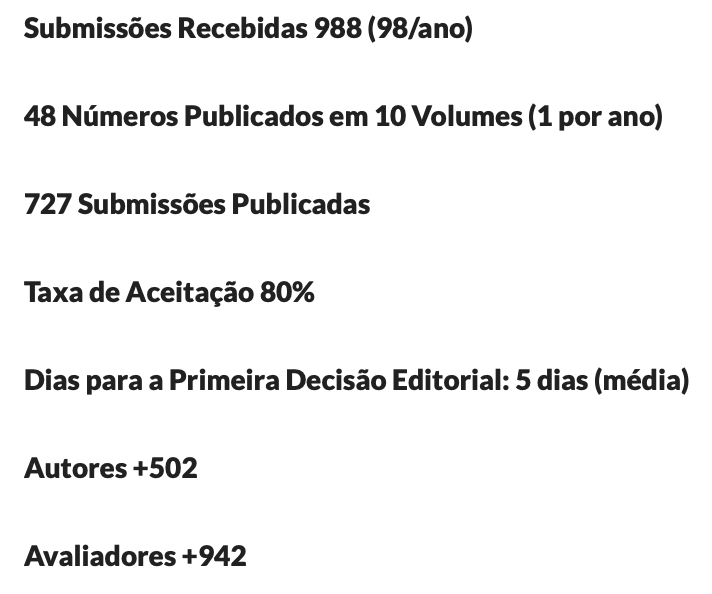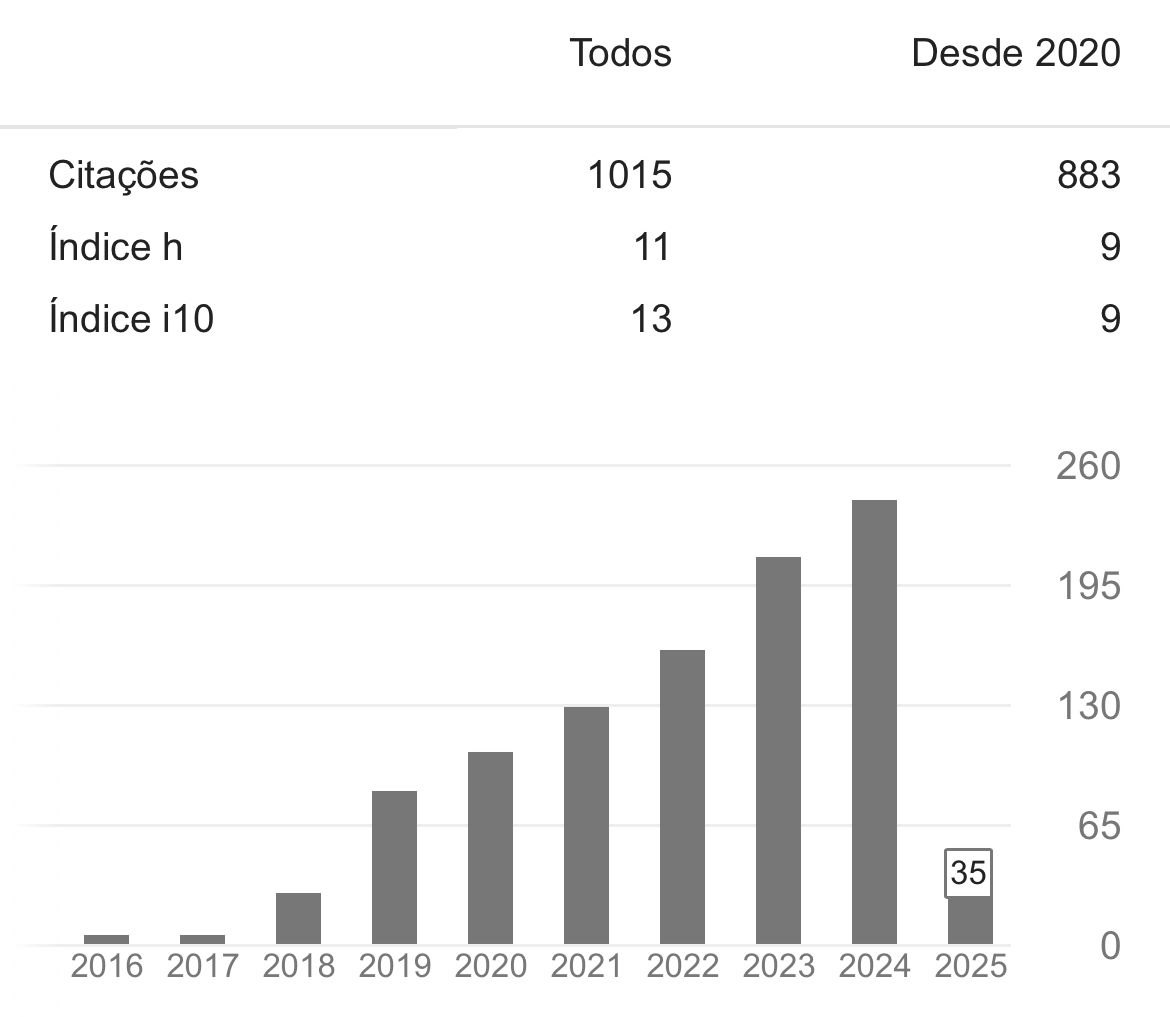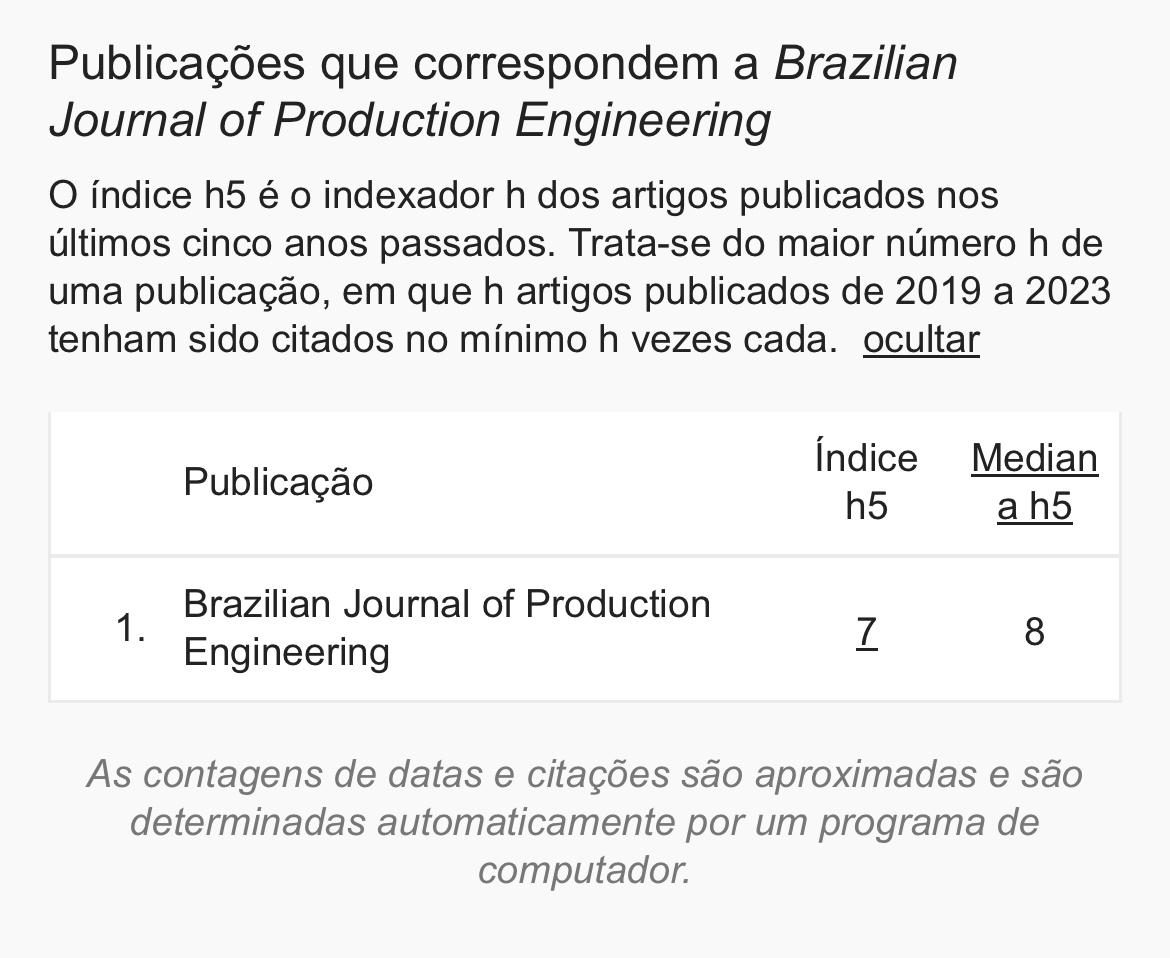Análise bibliométrica e tendências da pesquisa sobre determinação de cloretos na indústria do petróleo
DOI:
https://doi.org/10.47456/bjpe.v9i3.40905Palavras-chave:
Cloretos inorgânicos, petróleo, bibliometriaResumo
A presença de cloretos inorgânicos, mesmo em baixas concentrações no petróleo, está associada a uma série de problemas operacionais. A determinação de cloretos inorgânicos tem importante papel na indústria do petróleo. Neste estudo, uma análise bibliométrica usando o aplicativo gratuito VOSviewer e a base de dados da Web of Science foi realizada para fornecer uma visão geral na aplicação da determinação de cloretos em petróleo. Um total de 3117 artigos foi analisado em vários aspectos das características da publicação, como produção de publicações, países, instituições, periódicos, artigos altamente citados e palavras-chave. O número de publicações nessa aplicação aumentou de forma constante nos últimos 23 anos. China e EUA foram os países com maior índice de link strength. A China teve um papel central na rede de colaboração entre os países mais produtivos. A Universidade Federal de Santa Maria (UFSM) foi a instituição com maior link strength (88). Energy & Fuels foi o jornal mais produtivo (173). As palavras-chave tensão superficial, líquidos iônicos, emulsão, desemulsificação, adsorção, potencial zeta e molhabilidade são considerados futuros pontos críticos de pesquisa.
Downloads
Referências
Adeyemo, D. J., Umar, I. M., Funtua, I. I., Thomas, S. A. & Agbaji, E. B. (2006). Trace Multielement Content of Some Crude Oils by Instrumental Neutron Activation Analysis Techniques. Instrumentation Science & Technology, 32(6), 681–687. https://doi.org/10.1081/CI-200037038 DOI: https://doi.org/10.1081/CI-200037038
Agência Nacional de Petróleo. (2022, 29. July). Anuário Estatístico 2022. https://www.gov.br/anp/pt-br/centrais-de-conteudo/dados-abertos/anuario-estatistico-2022
Aguiar, D. V. A. de, da Silva Lima, G., da Silva, R. R., Júnior, I. M., Gomes, A. de O., Mendes, L. A. N. & Vaz, B. G. (2022). Comprehensive composition and comparison of acidic nitrogen- and oxygen-containing compounds from pre- and post-salt Brazilian crude oil samples by ESI (-) FT-ICR MS. Fuel, 326(July), 125129. https://doi.org/10.1016/j.fuel.2022.125129 DOI: https://doi.org/10.1016/j.fuel.2022.125129
Aria, M. & Cuccurullo, C. (2017). bibliometrix: An R-tool for comprehensive science mapping analysis. Journal of Informetrics, 11(4), 959–975. https://doi.org/10.1016/J.JOI.2017.08.007 DOI: https://doi.org/10.1016/j.joi.2017.08.007
American Society for Testing and Materials. ASTM D3230-19. (2019). Standard Test Method for Salts in Crude Oil (Electrometric Method). https://www.astm.org/Standards/D3230.htm
American Society for Testing and Materials. ASTM D512-12. (2021). Standard Test Methods for Chloride Ion in Water. https://doi.org/10.1520/D0512-12.2
American Society for Testing and Materials. ASTM D6470-99. (2020). Standard Test Method for Salt in Crude Oils (Potentiometric Method). https://doi.org/10.1520/D6470-99R20 DOI: https://doi.org/10.1520/D6470-99R20
Biresselioglu, M. E., Demir, M. H., Solak, B., Kayacan, A. & Altinci, S. (2020). Investigating the trends in arctic research: The increasing role of social sciences and humanities. Science of The Total Environment, 729, 139027. https://doi.org/10.1016/J.SCITOTENV.2020.139027 DOI: https://doi.org/10.1016/j.scitotenv.2020.139027
Bueno, C. da S., Sattamini, S. R., Santa Anna, L. M. M., Silveira, J. M. F. J. da, Buainain, A. M. & Poz, M. E. S. D. (2017). Rede de cooperação tecnológica da petrobras e universidades e das suas áreas de tecnologia: panorama atual e perspectivas. Revista Iniciativa Econômica, 3(1), 66–89. Recuperado de https://periodicos.fclar.unesp.br/iniciativa/article/view/10970/7483 DOI: https://doi.org/10.5151/enei2017-01
Campos, A. F., Cassella, A. R. & Cassella, R. J. (2020). Microwave-Assisted Extraction of Chloride Followed by Ion Chromatography as an Alternative to the ASTM D6470 Method for the Determination of Crude Oil Salinity. Energy and Fuels, 34(6), 6844–6850. https://doi.org/10.1021/acs.energyfuels.0c00425 DOI: https://doi.org/10.1021/acs.energyfuels.0c00425
Cardoso, A. L., Neves, S. C. G. & da Silva, M. J. (2008). Esterification of Oleic Acid for Biodiesel Production Catalyzed by SnCl2: A Kinetic Investigation. Energies 2008, Vol. 1, Pages 79-92, 1(2), 79–92. https://doi.org/10.3390/EN1020079 DOI: https://doi.org/10.3390/en1020079
Coutinho, D. M., França, D., Vanini, G., Gomes, A. O. & Azevedo, D. A. (2022). Understanding the molecular composition of petroleum and its distillation cuts. Fuel, 311(November 2021), 122594. https://doi.org/10.1016/j.fuel.2021.122594 DOI: https://doi.org/10.1016/j.fuel.2021.122594
Delfino, R. J., Gong, H., Linn, W. S., Hu, Y. & Pellizzari, E. D. (2003). Respiratory symptoms and peak expiratory flow in children with asthma in relation to volatile organic compounds in exhaled breath and ambient air. Journal of Exposure Science & Environmental Epidemiology, 13(5), 348–363. https://doi.org/10.1038/sj.jea.7500287 DOI: https://doi.org/10.1038/sj.jea.7500287
Deyab, M. A. (2007). Effect of cationic surfactant and inorganic anions on the electrochemical behavior of carbon steel in formation water. Corrosion Science, 49(5), 2315–2328. https://doi.org/10.1016/J.CORSCI.2006.10.035 DOI: https://doi.org/10.1016/j.corsci.2006.10.035
Doyle, A., Saavedra, A., Tristão, M. L. B., Nele, M. & Aucélio, R. Q. (2011). Direct chlorine determination in crude oils by energy dispersive X-ray fl uorescence spectrometry : An improved method based on a proper strategy for sample homogenization and calibration with inorganic standards. Spectrochimica Acta Part B: Atomic Spectroscopy, 66(5), 368–372. https://doi.org/10.1016/j.sab.2011.05.001 DOI: https://doi.org/10.1016/j.sab.2011.05.001
Enders, M. S. P., Anschau, K. F., Doneda, M., Druzian, G. T., Gomes, A. O., Guimaraes, R. C. L., Flores, E. M. M. & Muller, E. I. (2020). Characterization of Inorganic Solids Present in Brazilian Crude Oil Emulsions Using Scanning Electron Microscopy (SEM) with Energy-Dispersive X-ray Spectrometry (EDS): Evaluation of the Effect of Solvents. Energy and Fuels, 34(2), 1309–1316. https://doi.org/10.1021/acs.energyfuels.9b03087 DOI: https://doi.org/10.1021/acs.energyfuels.9b03087
Fernandes, H. A., Zanelato, L. N., Decote, P. A. P., Santos, H. N., Senger, C. M., Dias, F. C., Muller, E. I., Flores, E. M. M., Mendes, L. A. N., Vicente, M. A. & Santos, M. F. P. (2022). Effects of calcium, magnesium, and strontium chlorides in determining the total acid number using potentiometric titration. Fuel, 311(1), 122522. https://doi.org/10.1016/J.FUEL.2021.122522 DOI: https://doi.org/10.1016/j.fuel.2021.122522
Fu, H. Z., Wang, M. H. & Ho, Y. S. (2013). Mapping of drinking water research: A bibliometric analysis of research output during 1992–2011. Science of The Total Environment, 443, 757–765. https://doi.org/10.1016/J.SCITOTENV.2012.11.061 DOI: https://doi.org/10.1016/j.scitotenv.2012.11.061
Gab-Allah, M. A., Goda, E. S., Shehata, A. B. & Gamal, H. (2020). Critical Review on the Analytical Methods for the Determination of Sulfur and Trace Elements in Crude Oil. Critical Reviews in Analytical Chemistry, 50(2), 161–178. https://doi.org/10.1080/10408347.2019.1599278 DOI: https://doi.org/10.1080/10408347.2019.1599278
Gajdosechova, Z., Dutta, M., Lopez-Linares, F., de Azevedo Mello, P., Dineck Iop, G., Moraes Flores, E. M., Mester, Z. & Pagliano, E. (2021). Determination of chloride in crude oil using isotope dilution GC–MS: A comparative study. Fuel, 285, 119167. https://doi.org/10.1016/j.fuel.2020.119167 DOI: https://doi.org/10.1016/j.fuel.2020.119167
Gazulla, M. F., Ventura, M. J., Orduña, M., Rodrigo, M. & Torres, A. (2022). Determination of trace metals by ICP-OES in petroleum cokes using a novel microwave assisted digestion method. Talanta Open, 6, 100134. https://doi.org/10.1016/J.TALO.2022.100134 DOI: https://doi.org/10.1016/j.talo.2022.100134
Gorrepati, E. A., Wongthahan, P., Raha, S. & Fogler, H. S. (2010). Silica precipitation in acidic solutions: Mechanism, pH effect, and salt effect. Langmuir, 26(13), 10467–10474. https://doi.org/10.1021/LA904685X DOI: https://doi.org/10.1021/la904685x
Granatelli, L. (1957). Determination of Organically Bound Chlorine in Petroleum Fractions with Oxyhydrogen Burner. Analytical Chemistry, 29(2), 238–241. https://doi.org/10.1021/AC60122A017 DOI: https://doi.org/10.1021/ac60122a017
Hezave, A. Z., Dorostkar, S., Ayatollahi, S., Nabipour, M. & Hemmateenejad, B. (2013). Dynamic interfacial tension behavior between heavy crude oil and ionic liquid solution (1-dodecyl-3-methylimidazolium chloride ([C12mim][Cl] + distilled or saline water/heavy crude oil)) as a new surfactant. Journal of Molecular Liquids, 187, 83–89. https://doi.org/10.1016/J.MOLLIQ.2013.05.007 DOI: https://doi.org/10.1016/j.molliq.2013.05.007
Holkem, A. P., Voss, M., Schlesner, S. K., Helfer, G. A., Costa, A. B., Barin, J. S., Müller, E. I. & Mello, P. A. (2021). A green and high throughput method for salt determination in crude oil using digital image-based colorimetry in a portable device. Fuel, 289(December 2020), 119941. https://doi.org/10.1016/j.fuel.2020.119941 DOI: https://doi.org/10.1016/j.fuel.2020.119941
Katona, R., Krójer, A., Locskai, R., Bátor, G. & Kovács, T. (2021). Comparison of analytical methods for measuring chloride content in crude oil. Applied Radiation and Isotopes Journal, 170, 109594. https://doi.org/10.1016/j.apradiso.2021.109594 DOI: https://doi.org/10.1016/j.apradiso.2021.109594
Kondash, A. J., Lauer, N. E. & Vengosh, A. (2018). The intensification of the water footprint of hydraulic fracturing. Science Advances, 4, 1–8. https://doi.org/10.1126/SCIADV.AAX8764 DOI: https://doi.org/10.1126/sciadv.aar5982
Lashkarbolooki, M., Ayatollahi, S. & Riazi, M. (2014). The impacts of aqueous ions on interfacial tension and wettability of an asphaltenic-acidic crude oil reservoir during smart water injection. Journal of Chemical and Engineering Data, 59(11), 3624–3634. https://doi.org/10.1021/JE500730E DOI: https://doi.org/10.1021/je500730e
Li, N., Han, R. & Lu, X. (2018). Bibliometric analysis of research trends on solid waste reuse and recycling during 1992–2016. Resources, Conservation and Recycling, 130, 109–117. https://doi.org/10.1016/J.RESCONREC.2017.11.008 DOI: https://doi.org/10.1016/j.resconrec.2017.11.008
Mello, P. A., Pereira, J. S. F., Mesko, M. F., Barin, J. S. & Flores, E. M. M. (2012). Sample preparation methods for subsequent determination of metals and non-metals in crude oil — A review. Analytica Chimica Acta, 746, 15–36. https://doi.org/10.1016/j.aca.2012.08.009 DOI: https://doi.org/10.1016/j.aca.2012.08.009
Mitra, S., Sulakhe, S., Shown, B., Mandal, S. & Das, A. K. (2022). Organic chlorides in petroleum crude oil: Challenges for refinery and mitigations. ChemBioEng Reviews, 9(3), 319–332. https://doi.org/10.1002/CBEN.202100046 DOI: https://doi.org/10.1002/cben.202100046
Nelson, J. & Lopez-linares, F. (2019). Determination of chloride in crude oils by direct dilution using inductively coupled plasma tandem. J. Anal. At. Spectrom., 34, 1433–1438. https://doi.org/10.1039/c9ja00096h DOI: https://doi.org/10.1039/C9JA00096H
Pagliano, E., Gajdosechova, Z., Lopez-Linares, F. & Mester, Z. (2021). Conversion of inorganic chlorides into organochlorine compounds during crude oil distillation: Myth or reality? Energy and Fuels, 35(1), 894–897. https://doi.org/10.1021/ACS.ENERGYFUELS.0C03702 DOI: https://doi.org/10.1021/acs.energyfuels.0c03702
Parra-Barraza, H., Hernández-Montiel, D., Lizardi, J., Hernández, J., Herrera Urbina, R. & Valdez, M. A. (2003). The zeta potential and surface properties of asphaltenes obtained with different crude oil/n-heptane proportions☆. Fuel, 82(8), 869–874. https://doi.org/10.1016/S0016-2361(03)00002-4 DOI: https://doi.org/10.1016/S0016-2361(03)00002-4
Pereira, J. S. F., Mello, P. A., Moraes, D. P., Duarte, F. A., Dressler, V. L., Knapp, G. & Flores, É. M. M. (2009). Chlorine and sulfur determination in extra-heavy crude oil by inductively coupled plasma optical emission spectrometry after microwave-induced combustion. Spectrochimica Acta - Part B Atomic Spectroscopy, 64(6), 554–558. https://doi.org/10.1016/j.sab.2009.01.011 DOI: https://doi.org/10.1016/j.sab.2009.01.011
Robaina, N. F., Feiteira, F. N., Cassella, A. R. & Cassella, R. J. (2016). Determination of chloride in brazilian crude oils by ion chromatography after extraction induced by emulsion breaking. Journal of Chromatography A, 1458, 112–117. https://doi.org/10.1016/j.chroma.2016.06.066 DOI: https://doi.org/10.1016/j.chroma.2016.06.066
Santana, A. P. R., Nascimento, P. D. A., Guimarães, T. G. S., Menezes, I. M. N. R., Andrade, D. F., Oliveira, A. & Gonzalez, M. H. (2022). ( Re ) thinking towards a sustainable analytical chemistry : Part I : Inorganic elemental sample treatment , and Part II : Alternative solvents and extraction techniques ( Re ) thinking towards a sustainable analytical chemistry : Part I : Inorganic eleme. Trends in Analytical Chemistry, 152, 116596. https://doi.org/10.1016/j.trac.2022.116596 DOI: https://doi.org/10.1016/j.trac.2022.116596
Schutte, G. R. (2021). A economia política do conteúdo local no setor petrolífero de Lula a Temer. Economia e Sociedade, 30(1), 115–140. https://doi.org/10.1590/1982-3533.2020V30N1ART06 DOI: https://doi.org/10.1590/1982-3533.2020v30n1art06
Seeger, T. S., Muller, E. I., Mesko, M. F. & Duarte, F. A. (2019). Magnesium and calcium determination in desalted crude oil by direct sampling graphite furnace atomic absorption spectrometry. Fuel, 236, 1483–1488. https://doi.org/10.1016/j.fuel.2018.09.108 DOI: https://doi.org/10.1016/j.fuel.2018.09.108
Shishkova, I., Stratiev, D., Kolev, I. V., Nenov, S., Nedanovski, D., Atanassov, K., Ivanov, V. & Ribagin, S. (2022). Challenges in petroleum characterization—A review. Energies, 15(20), 7765. https://doi.org/10.3390/en15207765 DOI: https://doi.org/10.3390/en15207765
Silva, F. A., Rigui, B. R., Andriolli, C. R., Flores, E. M. M., Mello, P. A. & Picoloto, R. S. (2023). A miniaturized liquid-liquid extraction method for further Na, K, Ca, and Mg determination in crude oil by FAAS. Talanta, 257, 124297. https://doi.org/10.1016/J.TALANTA.2023.124297 DOI: https://doi.org/10.1016/j.talanta.2023.124297
Soares, A. S. F., da Costa Marques, M. R. & da Cunha Costa, L. (2022). Physical-chemical characterization and leaching studies involving drill cuttings generated in oil and gas pre-salt drilling activities. Environmental Science and Pollution Research, 1, 1–16. https://doi.org/10.1007/S11356-022-23398-7 DOI: https://doi.org/10.1007/s11356-022-23398-7
Souza, M. O., Ribeiro, M. A., Carneiro, M. T. W. D., Athayde, G. P. B., Castro, E. V. R. de, Silva, F. L. F., Matos, W. O. & Ferreira, R. de Q. (2015). Evaluation and determination of chloride in crude oil based on the counterions Na, Ca, Mg, Sr and Fe, quantified via ICP-OES in the crude oil aqueous extract. Fuel, 154, 181–187. https://doi.org/10.1016/j.fuel.2015.03.079 DOI: https://doi.org/10.1016/j.fuel.2015.03.079
Speight, J. G. (2014). The chemistry and technology of petroleum (5th ed.). Cengage Learning. DOI: https://doi.org/10.1201/b16559
Stratiev, D., Shishkova, I., Dinkov, R., Nenov, S., Sotirov, S., Sotirova, E., Kolev, I., Ivanov, V., Ribagin, S., Atanassov, K., Stratiev, D., Yordanov, D. & Nedanovski, D. (2023). Prediction of petroleum viscosity from molecular weight and density. Fuel, 331(P1), 125679. https://doi.org/10.1016/j.fuel.2022.125679 DOI: https://doi.org/10.1016/j.fuel.2022.125679
Suliman, M. A., Olarewaju, A., Basheer, C. & Lee, H. K. (2021). Microextraction and its app lication for petroleum and crude oil samples. Journal of Chromatography A, 1636, 461795. https://doi.org/10.1016/j.chroma.2020.461795 DOI: https://doi.org/10.1016/j.chroma.2020.461795
Synnestvedt, M. B., Chen, C. & Holmes, J. H. (2005). CiteSpace II: visualization and knowledge discovery in bibliographic databases. AMIA ... Annual Symposium Proceedings / AMIA Symposium. AMIA Symposium, February, 724–728. recuperado de https://www.ncbi.nlm.nih.gov/pmc/articles/PMC1560567/
Van Eck, N. J. & Waltman, L. (2010). Software survey: VOSviewer, a computer program for bibliometric mapping. Scientometrics, 84(2), 523–538. https://doi.org/10.1007/S11192-009-0146-3/FIGURES/7 DOI: https://doi.org/10.1007/s11192-009-0146-3
Wu, B., Li, Y., Li, X., Zhu, J., Ma, R. & Hu, S. (2018). Organochlorine compounds with a low boiling point in desalted crude oil: Identification and conversion. Energy and Fuels, 32(6), 6475–6481. https://doi.org/10.1021/ACS.ENERGYFUELS.8B00205 DOI: https://doi.org/10.1021/acs.energyfuels.8b00205
Xu, Q., Chen, C., Rosswurm, K., Yao, T. & Janaswamy, S. (2016). A facile route to prepare cellulose-based films. Carbohydrate Polymers, 149, 274–281. https://doi.org/10.1016/J.CARBPOL.2016.04.114 DOI: https://doi.org/10.1016/j.carbpol.2016.04.114
Yao, T. C. & Porsche, F. W. (1959). Determination of sulfur and chlorine in petroleum liquids by X-Ray fluorescence. Analytical Chemistry, 31(12), 2010–2012. https://doi.org/10.1021/ac60156a038 DOI: https://doi.org/10.1021/ac60156a038
Zeinolabedini Hezave, A., Dorostkar, S., Ayatollahi, S., Nabipour, M. & Hemmateenejad, B. (2013). Effect of different families (imidazolium and pyridinium) of ionic liquids-based surfactants on interfacial tension of water/crude oil system. Fluid Phase Equilibria, 360, 139–145. https://doi.org/10.1016/J.FLUID.2013.09.025 DOI: https://doi.org/10.1016/j.fluid.2013.09.025

Downloads
Publicado
Como Citar
Edição
Seção
Licença
Copyright (c) 2023 Brazilian Journal of Production Engineering

Este trabalho está licenciado sob uma licença Creative Commons Attribution-NonCommercial-ShareAlike 4.0 International License.

Atribuição 4.0 internacional CC BY 4.0 Deed
Esta licença permite que outros remixem, adaptem e desenvolvam seu trabalho não comercialmente, contanto que eles creditem a você e licenciem suas novas criações sob os mesmos termos.
















































































